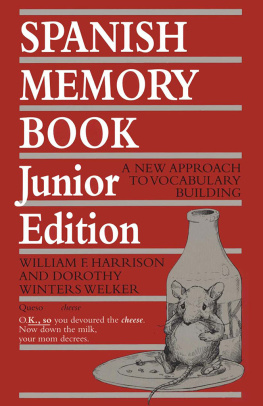William F. Harrison - Portuguese Memory Book: A New Approach to Vocabulary Building
Here you can read online William F. Harrison - Portuguese Memory Book: A New Approach to Vocabulary Building full text of the book (entire story) in english for free. Download pdf and epub, get meaning, cover and reviews about this ebook. year: 1996, publisher: University of Texas Press, genre: Romance novel. Description of the work, (preface) as well as reviews are available. Best literature library LitArk.com created for fans of good reading and offers a wide selection of genres:
Romance novel
Science fiction
Adventure
Detective
Science
History
Home and family
Prose
Art
Politics
Computer
Non-fiction
Religion
Business
Children
Humor
Choose a favorite category and find really read worthwhile books. Enjoy immersion in the world of imagination, feel the emotions of the characters or learn something new for yourself, make an fascinating discovery.
- Book:Portuguese Memory Book: A New Approach to Vocabulary Building
- Author:
- Publisher:University of Texas Press
- Genre:
- Year:1996
- Rating:5 / 5
- Favourites:Add to favourites
- Your mark:
- 100
- 1
- 2
- 3
- 4
- 5
Portuguese Memory Book: A New Approach to Vocabulary Building: summary, description and annotation
We offer to read an annotation, description, summary or preface (depends on what the author of the book "Portuguese Memory Book: A New Approach to Vocabulary Building" wrote himself). If you haven't found the necessary information about the book — write in the comments, we will try to find it.
Clever mnemonic jingles to help learn Portuguese vocabulary.
Portuguese Memory Book: A New Approach to Vocabulary Building — read online for free the complete book (whole text) full work
Below is the text of the book, divided by pages. System saving the place of the last page read, allows you to conveniently read the book "Portuguese Memory Book: A New Approach to Vocabulary Building" online for free, without having to search again every time where you left off. Put a bookmark, and you can go to the page where you finished reading at any time.
Font size:
Interval:
Bookmark:
Portuguese Memory BookA New Approach to Vocabulary Building William F. Harrison and Dorothy Winters Welker 
University of Texas Press
Austin Copyright 1996 by the University of Texas Press All rights reserved First edition, 1996 Requests for permission to reproduce material from this work should be sent to Permissions, University of Texas Press, P.O. Box 7819, Austin, TX 78713-7819 Library of Congress Cataloging-in-Publication Data Harrison, William F., 1934 Portuguese memory book : a new approach to vocabulary building / by William F. Harrison and Dorothy Winters Welker. 1st ed. cm. cm.
ISBN 0-292-73105-1 (cl.: alk. paper). ISBN 0-292-73106-X (pbk.: alk. paper) 1. Portuguese languageVocabulary. 2.
Portuguese languageProvincialismsBrazilRio de Janeiro. I. Welker, Dorothy Winters, 1905 . II. Title. PC5256.H37 1996 469.81dc20 96-11038 ISBN 978-0-292-79266-1 (library e-book)
ISBN 978-0-292-77932-7 (individual e-book) DOI 10.7560/731059 CONTENTS INTRODUCTION This book will introduce you to Brazilian Portuguese, the language spoken in the South American country of Brazil.
Many Portuguese dialects are heard in that vast country. Of these, the Carioca dialect of Rio de Janeiro is one of the most popular, and is the dialect that is used in this book. In dealing with any new language, one of the first things you will want to do is to acquire a stock of useful words that you can recognize and pronounce easily. The Portuguese Memory Book shows you how to accomplish this task quickly and effortlessly. It enables you to recognize many Portuguese words when you see or hear them (passive vocabulary), and to recall these words when you speak or write (active vocabulary). Although the Portuguese heard in Portugal is somewhat different from that of Brazil, you will be able to understand the peninsular version after you have become familiar with Brazilian Portuguese.
The Portuguese Memory Book is about vocabulary, and vocabulary only. That is why it can help you learn vocabulary so fast. It is not a textbook on grammar. If you are interested in learning Portuguese grammar, you should consult a teacher of Brazilian Portuguese or a good grammar textbook. The Portuguese Memory Book shows you how to use mnemonic devices to learn vocabulary. A mnemonic device sets up an association between a new word and one or more familiar words that enables you to recall the new word easily.
Mnemonic devices are not new, of course; they have been used for centuries. We still call upon them every day to help us remember names, numbers, and many other things: Spring forward in the spring; fall back in the fall" is one example. The mnemonic devices used in the Portuguese Memory Book are short jingles that present the pronunciation of a Portuguese word along with the English meaning of that word. They fairly jingle the new words into your memory. Research has shown, surprisingly enough, that the more far-fetched, even absurd, a mnemonic device is, the better it helps you remember. You will probably agree that many of the jingles in the Portuguese Memory Book qualify for high marks in absurdity.
You will enjoy learning and applying them. The Portuguese Memory Book contains mnemonic jingles for more than 500 words useful for conversation and reading. Most of these words have been culled from the American Council of Educations A Graded Word Book of Brazilian Portuguese (Brown et al., 1945), a standard work that is still a valuable compendium. Additional words were taken from contemporary textbooks. HOW TO USE THE Portuguese Memory Book Each jingle in this book gives you two pieces of information about a Portuguese word: 1) its sound (pronunciation, including stress, or accent), and 2) its sense (meaning). The jingle uses the word in a natural setting that helps you store in your memory both the sound and the sense of the word.
You need not memorize an entire lyric. Just remember the significant parts. The following jingle will show you how the method works. noite (f.) night Dont an noyChi huahuas in the night. If you ignore their bark, youll feel their bite. The Portuguese word to be learned is noite .
The English equivalent of noite is "night, which is in boldface type in the jingle. The sound of noite is given by the last syllable of an noy plus the first syllable of Chi huahua. In the jingle, the syllables noy and Chi are printed in boldface type and underscored. These two syllables, read together, spell out the sound of the complete Portuguese word noite . Note that here, as always in this book, the English sounds used to spell out the sound of the Portuguese word are consecutive . That makes them easy to recognize and to remember.
The meter for each jingle was chosen so that the accent falls on the stressed syllable of the Portuguese word. Here is another example: coelho rabbit That quail you see has non-fowl habits. She likes to play around with rabbits. The sound and stress of Portuguese coelho are given by quail plus you . CONVENTIONS USED IN THIS BOOK As far as possible, the jingles reproduce the sounds and stresses of the Portuguese words. Three Brazilian sounds require special treatment: 1) nasalized vowels and diphthongs; 2) r in certain combinations; 3) s in certain combinations.
These are explained below: 1. In Portuguese, vowels and diphthongs can be either plain or nasalized. A nasalized vowel is produced when air is allowed to resonate in the nose as well as in the mouth. Example: plain vowel, m oo ; nasalized vowel, m oo n. Portuguese nasalized vowels and diphthongs are more highly nasalized than nasalized sounds in English. In this book a nasalized vowel is indicated by an italicized m or n following the vowel.
These italicized letters are not pronounced. Example: mundo earth, world Look at the moon. Do you know why It follows the earth around the sky? The sound of mundo is given by the moo of moon plus Do . In this book the italicized n is simply a signal that the oo of m oo is to be nasalized. (In certain words, such as mundo , a faint suggestion of an n can be heard in the background.) 2. The r between vowels or in consonant clusters (p r , b r , d r , t r , c r , g r , f r ) has the sound of the tt , in American English po tt y.
Here is an example: choro weeping, sobbing (n.) The show rout inely ends with weeping, At least for all who still arent sleeping. The sound of the Portuguese word is captured by the word show followed by the rou of rou tinely. As the rule just given requires, the r in choro is pronounced like the tt in po tt y. This r is left unmarked. When r is not between vowels and is not in a consonant cluster it has the sound of a highly exaggerated h (approximating the Spanish j ). In this book this sound is indicated by an italicized r in bold print.
Here is an example: roubar to rob You must p robe Ar thurs links with crime. He robbed his Ma of her last dime. The sound of roubar is built up from the sound of robe in p robe plus Ar of Ar thurs. Both the initial and the final r of roubar have the sound of a highly exaggerated h . 3. The letter s has several sounds in Carioca Portuguese, depending on its environment in a word.
Before the sounds p , t , k , and at the end of a breath group, s has the sound of sh in sh irt. In this book the sh sound is represented by an italicized s. Here is an example: bispo bishop Bee, spoo n out some applesauce; The Bishop lost his dental floss! In this jingle, the sound of the Portuguese word is captured by the underscored syllables. As was noted above, the italicized
Next pageFont size:
Interval:
Bookmark:
Similar books «Portuguese Memory Book: A New Approach to Vocabulary Building»
Look at similar books to Portuguese Memory Book: A New Approach to Vocabulary Building. We have selected literature similar in name and meaning in the hope of providing readers with more options to find new, interesting, not yet read works.
Discussion, reviews of the book Portuguese Memory Book: A New Approach to Vocabulary Building and just readers' own opinions. Leave your comments, write what you think about the work, its meaning or the main characters. Specify what exactly you liked and what you didn't like, and why you think so.












